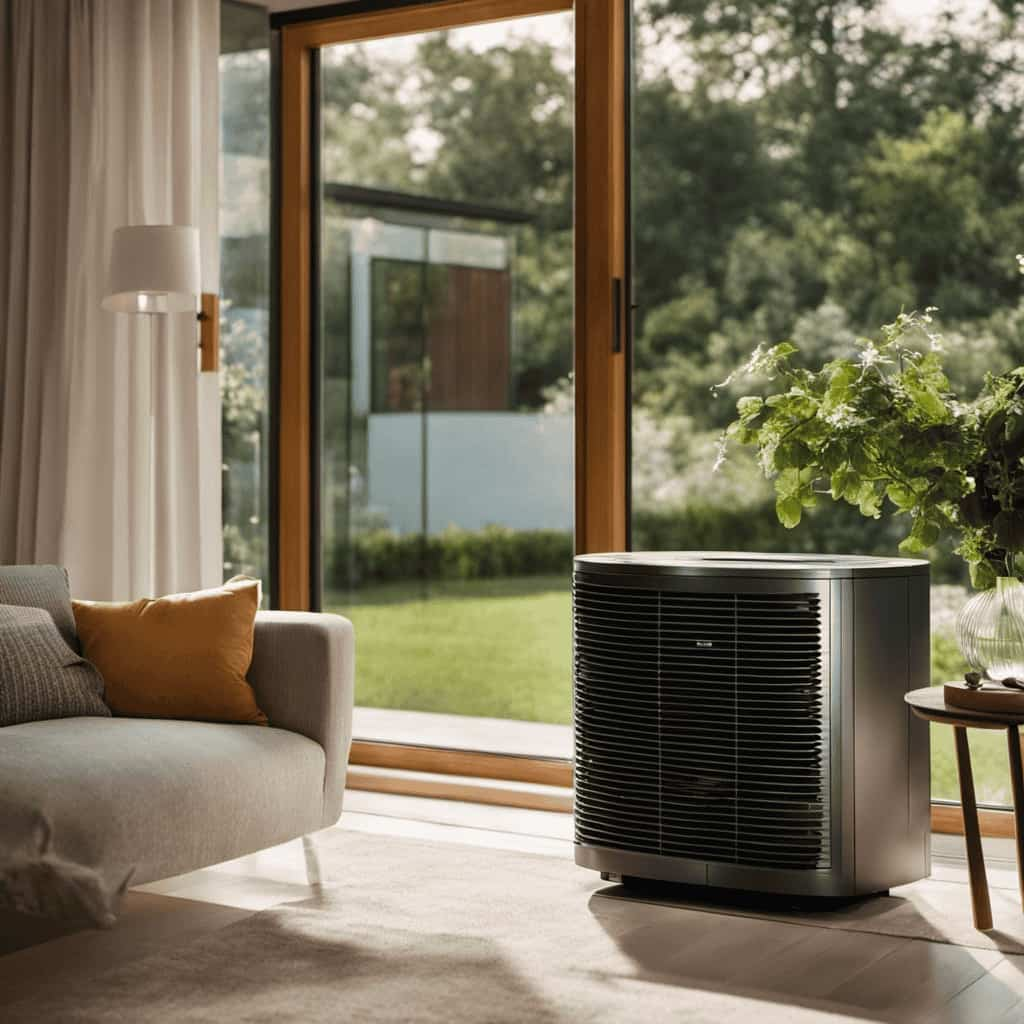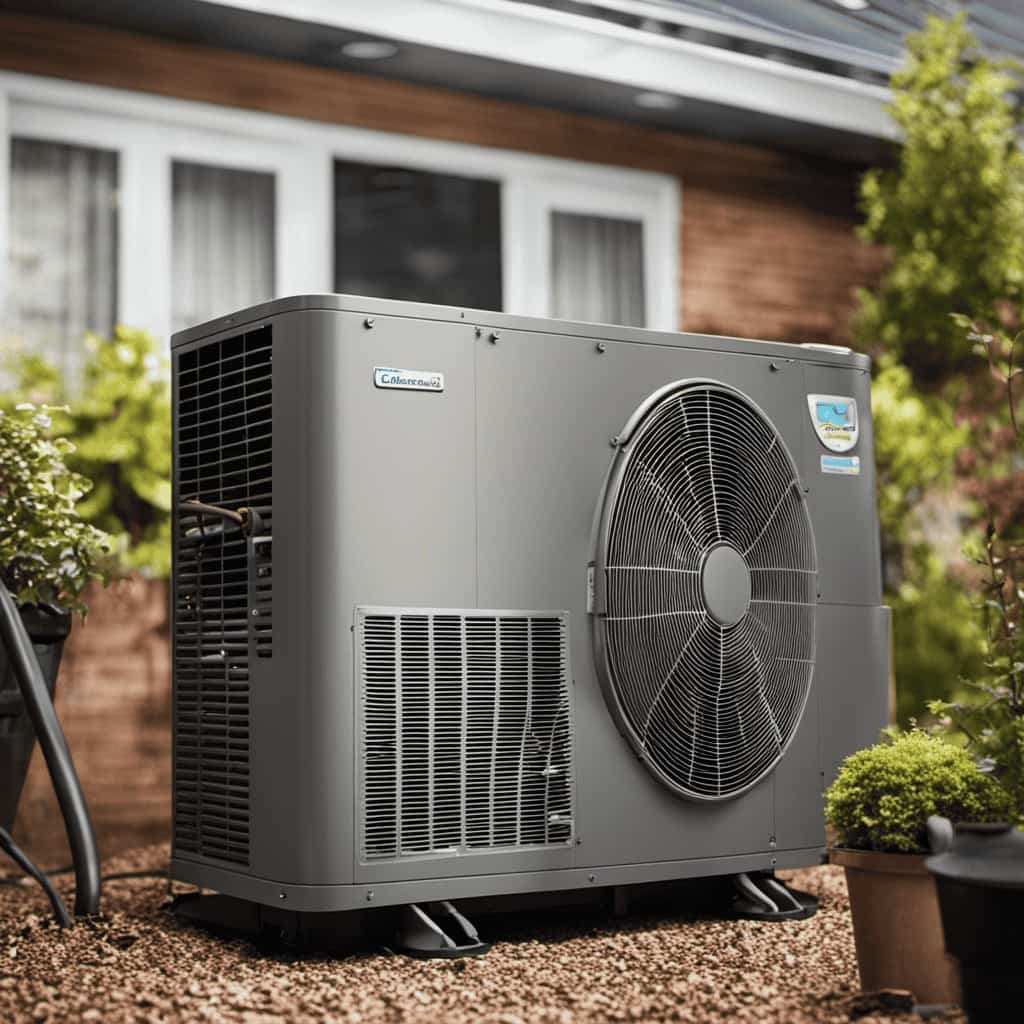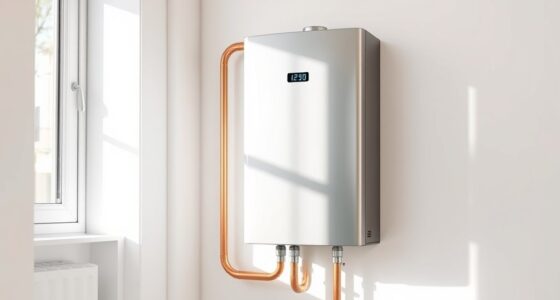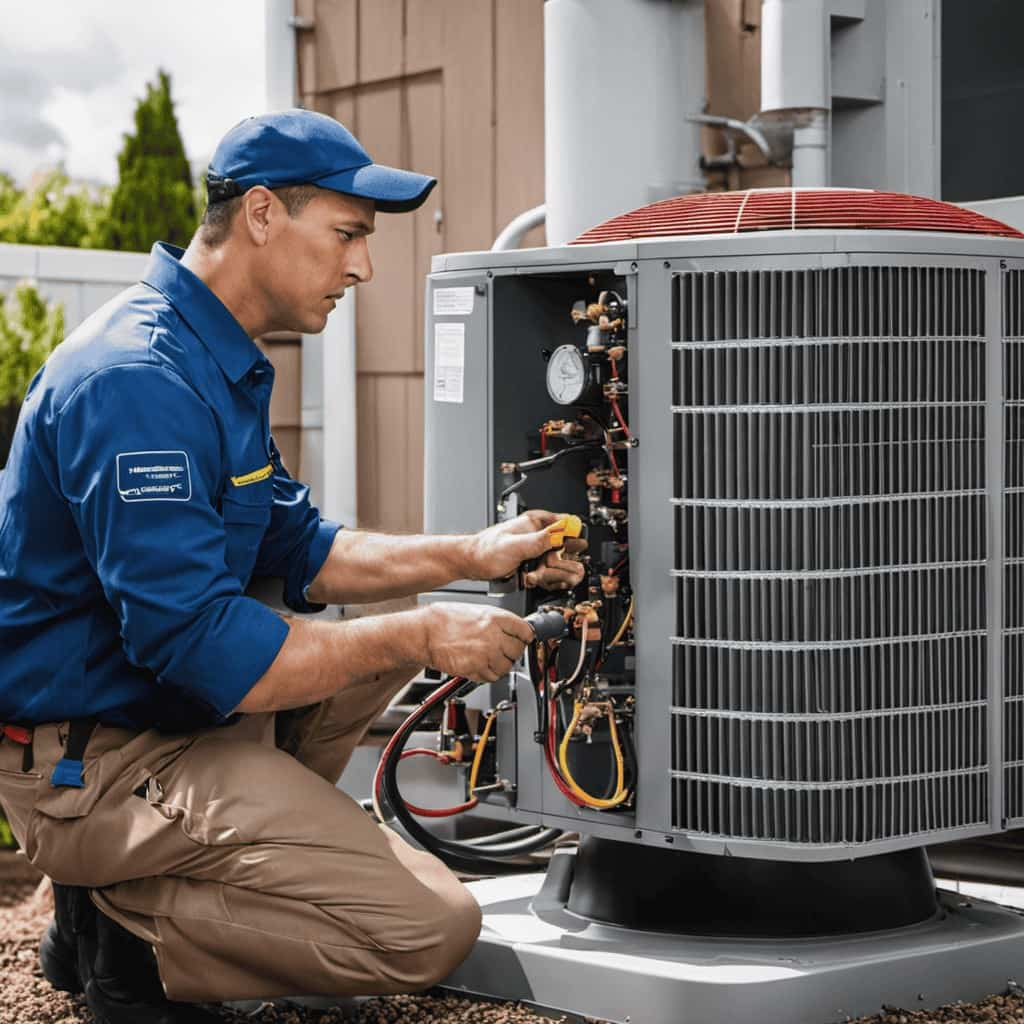We have some enlightening information to share with you.
Did you know that heating and cooling account for nearly half of a typical home’s energy consumption? That’s why it’s crucial to compare the energy efficiency of heat pumps and traditional heating systems.
In this article, we’ll provide a comprehensive analysis of factors like initial costs, long-term savings, and annual energy consumption.
Get ready to make an informed decision that will not only save you money but also reduce your environmental impact.

Key Takeaways
- Heat pumps are more energy efficient than traditional heating systems.
- Heat pumps have lower operating costs in the long run.
- Consider both energy efficiency and initial costs when choosing between the two.
- Heat pumps have lower annual energy consumption.
Understanding the Basics of Heat Pumps and Traditional Heating Systems
As we delve into the topic of understanding the basics of heat pumps and traditional heating systems, it’s important to note the key differences between the two.
When it comes to energy efficiency, heat pumps have a clear advantage. Heat pumps work by transferring heat from one location to another, rather than generating heat. This makes them more energy efficient compared to traditional heating systems, which rely on burning fuel to generate heat.
In terms of initial costs, traditional heating systems tend to be cheaper upfront. However, heat pumps have lower operating costs in the long run, as they require less energy to operate.
It’s important to consider both energy efficiency and initial costs when deciding between a heat pump and a traditional heating system.

Assessing Energy Efficiency Ratings of Heat Pumps and Traditional Heating Systems
We can evaluate the energy efficiency ratings of heat pumps and traditional heating systems by comparing their respective energy consumption levels. When assessing the energy efficiency of these systems, there are several key factors to consider:
Seasonal Energy Efficiency Ratio (SEER): This rating measures the cooling efficiency of a heat pump and indicates how much energy it uses to provide cooling during a typical cooling season.
Heating Seasonal Performance Factor (HSPF): HSPF is used to measure the heating efficiency of a heat pump and shows how much heat it provides compared to the electricity it consumes over a heating season.
Annual Fuel Utilization Efficiency (AFUE): AFUE is a rating used for traditional heating systems and measures the efficiency of converting fuel to heat over a year.

Energy Star Certification: Look for the Energy Star label, which indicates that the system meets strict energy efficiency guidelines set by the Environmental Protection Agency.
Energy Consumption Comparison: By comparing the energy consumption of heat pumps and traditional heating systems, you can determine which option is more energy-efficient and cost-effective for your specific needs.
Comparing Initial Costs of Heat Pumps and Traditional Heating Systems
When comparing heat pumps and traditional heating systems, we should consider the initial costs of each option. Evaluating energy efficiency is important, but it’s also essential to factor in the upfront expenses. Heat pumps tend to have higher initial costs compared to traditional heating systems. However, it’s important to calculate the payback period to determine the long-term savings. To emphasize this point, let’s take a look at the following table:
| Option | Initial Cost | Payback Period |
|---|---|---|
| Heat Pump | Higher | Shorter |
| Traditional Heating System | Lower | Longer |
As shown in the table, heat pumps may have higher initial costs, but they typically have a shorter payback period. This means that even though you may spend more upfront, you can recoup the investment through energy savings in a shorter amount of time.

Evaluating Long-Term Energy Savings With Heat Pumps and Traditional Heating Systems
Our evaluation of long-term energy savings with heat pumps and traditional heating systems reveals that they can vary significantly. When evaluating energy efficiency and cost effectiveness, it’s important to consider the following factors:
Energy Efficiency: Heat pumps are known for their high efficiency, as they transfer heat rather than generating it. This can result in significant energy savings compared to traditional heating systems.
Climate: The climate in which you live plays a crucial role in determining energy savings. Heat pumps are more efficient in moderate climates, while traditional heating systems may be more suitable for colder climates.
Maintenance and Lifespan: Heat pumps may require more regular maintenance compared to traditional heating systems. However, they generally have a longer lifespan, which can contribute to long-term energy savings.

Fuel Costs: The cost of fuel for traditional heating systems can vary greatly depending on the type of fuel used. Heat pumps, on the other hand, rely on electricity, which may have more stable pricing.
Rebates and Incentives: Some regions offer rebates and incentives for installing energy-efficient systems, including heat pumps. These can further enhance the cost effectiveness of heat pumps.
Analyzing Annual Energy Consumption of Heat Pumps and Traditional Heating Systems
When analyzing the annual energy consumption of heat pumps and traditional heating systems, there are two key points to consider: heat pump efficiency and cost comparison breakdown.
Heat pump efficiency refers to how effectively the heat pump converts energy into heat. By comparing the efficiency ratings of different heat pump models, we can determine which one will consume less energy over the course of a year.

Additionally, a cost comparison breakdown takes into account the initial cost of purchasing and installing a heat pump versus a traditional heating system, as well as the ongoing operational costs.
Analyzing these points will provide a comprehensive understanding of the annual energy consumption of both heating options.
Heat Pump Efficiency
In this section, we’ll analyze the annual energy consumption of heat pumps and traditional heating systems to determine their efficiency. When comparing the efficiency of heat pump technology and traditional heating systems, several factors need to be considered.
Here are the key points to keep in mind:

Coefficient of Performance (COP): The COP measures the heating output of a heat pump compared to the electrical energy input. A higher COP indicates better efficiency.
Seasonal Energy Efficiency Ratio (SEER): SEER measures the cooling efficiency of heat pumps. A higher SEER rating means more energy-efficient cooling.
Heating Seasonal Performance Factor (HSPF): HSPF measures the heating efficiency of heat pumps. A higher HSPF rating indicates better heating efficiency.
Energy Efficiency Ratio (EER): EER measures the cooling efficiency of traditional air conditioning units. A higher EER rating means more energy-efficient cooling.

Annual Fuel Utilization Efficiency (AFUE): AFUE measures the heating efficiency of traditional heating systems. A higher AFUE rating indicates better heating efficiency.
Cost Comparison Breakdown
We can now break down the cost comparison by analyzing the annual energy consumption of heat pumps and traditional heating systems. By conducting an energy usage analysis, we can determine the cost breakdown between these two types of heating systems. To better illustrate this, let’s take a look at the table below:
| Heating System | Annual Energy Consumption (kWh) | Cost per kWh (\() | Total Cost (\)) | |
|---|---|---|---|
| Heat Pump | 4000 | 0.12 | 480 |
| Traditional | 5000 | 0.15 | 750 |
As shown in the table, the heat pump has an annual energy consumption of 4000 kWh, with a cost per kWh of $0.12. This results in a total cost of $480. On the other hand, the traditional heating system has an annual energy consumption of 5000 kWh, with a cost per kWh of $0.15, resulting in a total cost of $750.
Now that we have analyzed the cost breakdown, let’s move on to considering the environmental impact of heat pumps versus traditional heating systems.

Considering Environmental Impact: Heat Pumps Vs Traditional Heating Systems
By comparing the environmental impact, we can evaluate the sustainability of heat pumps versus traditional heating systems.
When considering the carbon footprint comparison, heat pumps outperform traditional heating systems. Heat pumps utilize renewable energy sources such as the air, ground, or water, resulting in lower carbon emissions compared to systems that rely on fossil fuels. Additionally, heat pumps don’t produce any greenhouse gas emissions on-site, making them a cleaner alternative.
Another advantage is the reduced reliance on non-renewable resources. Heat pumps use electricity to transfer heat, which can be sourced from renewable energy, further reducing their environmental impact.
Moreover, heat pumps have a longer lifespan compared to traditional heating systems, reducing the amount of waste generated over time.

Lastly, heat pumps contribute to improved air quality as they don’t release pollutants or combustion byproducts into the atmosphere.
Factoring in Maintenance and Lifespan of Heat Pumps and Traditional Heating Systems
One important factor to consider when comparing heat pumps and traditional heating systems is the overall maintenance requirements and lifespan of the two options.
When it comes to maintenance costs, heat pumps generally require less frequent and less expensive maintenance compared to traditional heating systems. This is because heat pumps have fewer moving parts and are less prone to mechanical failures.
On the other hand, traditional heating systems, such as furnaces or boilers, may require regular inspections, cleanings, and repairs, which can add up over time.

In terms of lifespan, heat pumps typically have a longer lifespan compared to traditional heating systems. On average, heat pumps can last up to 15 to 20 years, while traditional heating systems may last around 10 to 15 years.
Therefore, when considering maintenance costs and lifespan, heat pumps may offer a more cost-effective and durable heating option.
Frequently Asked Questions
Are There Any Government Incentives or Tax Credits Available for Installing Heat Pumps or Traditional Heating Systems?
There may be government incentives or tax credits available for installing heat pumps or traditional heating systems. These incentives and credits can help offset the cost of installation and make these energy-efficient heating options more affordable for consumers.
What Are the Common Problems or Issues That Homeowners May Face With Heat Pumps or Traditional Heating Systems?
When it comes to common issues with heat pumps and traditional heating systems, we’ve seen it all. From minor glitches to major breakdowns, we’ve got the data-driven insights to help you navigate any heating hiccup.

Can Heat Pumps or Traditional Heating Systems Be Used for Both Heating and Cooling Purposes?
When comparing heat pumps vs. traditional HVAC systems, it’s important to consider their energy efficiency. Heat pumps can be used for both heating and cooling purposes, and they often consume less energy compared to traditional heating systems.
How Does the Installation Process Differ Between Heat Pumps and Traditional Heating Systems?
When comparing the installation process of heat pumps and traditional heating systems, it’s important to consider the cost comparison. By analyzing the steps and expenses involved, we can make an informed decision.
Are There Any Limitations or Specific Requirements for Installing Heat Pumps or Traditional Heating Systems in Older Homes or Buildings?
When considering the limitations and requirements for installing heat pumps or traditional heating systems in older homes or buildings, it’s important to evaluate factors such as space availability, electrical capacity, and insulation levels.
Which Is More Energy Efficient: Heat Pump or Traditional Heating?
When it comes to energy efficiency, the choice between a heat pump vs traditional heating system is worth considering. A heat pump utilizes a renewable energy source to transfer heat, making it highly efficient. On the other hand, traditional heating systems rely on burning fuel, which consumes more energy. Overall, a heat pump is more energy efficient in providing heat for your living space.
Conclusion
In conclusion, when comparing heat pumps and traditional heating systems, it’s clear that heat pumps offer significant energy savings and lower environmental impact.

One interesting statistic to note is that heat pumps can reduce energy consumption by up to 50% compared to traditional heating systems, resulting in substantial long-term cost savings for homeowners.
Additionally, heat pumps have a longer lifespan and require less maintenance, making them a more sustainable and efficient choice for heating needs.









